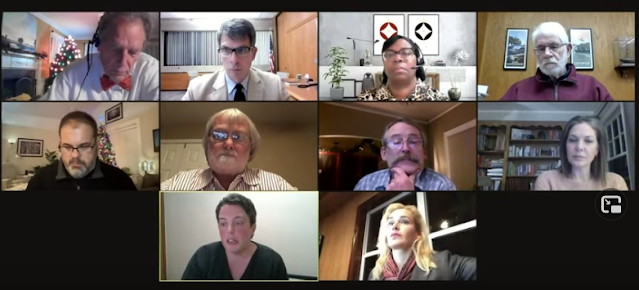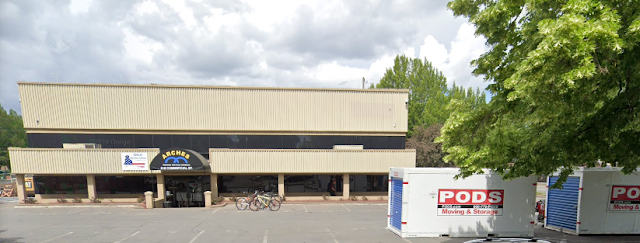By Sarah Owens and Michael Livingston
 |
| DevNW CEO Emily Reiman and Federal Programs Mgr Shelly Ehenger at Council on 12/14 |
At its last meeting in 2020, Council was again asked to approve HOME funding for the DevNW project (as Amendment #2 to the 2020-2021 Annual Action Plan). See "'Progressive' Council Snuffs Affordable Hsg Project" (20 June 2020). It did so by a vote of six (Andersen, Ausec, Bennett, Hoy, Lewis, Nordyke) to one (Nanke -- no reason given), with zero remarks from Mayor Bennett.
Bennett's silence speaks volumes about his character considering that, just last month, he had been the sole "no" vote on the motion to approve the project site plan and design review and had publicly chastised staff (and apparently Council) for "looking at investing
City money in this [housing project, which] makes me
increasingly uncomfortable that we haven't looked at this closely
enough. I hope in the future we'll look very closely at these kinds of
issues." See "'I do not understand the Mayor'" (1 December 2020).
The next big NIMBY fit is likely to be over Sequoia Crossings, a multifamily project that will turn vacant Salem Housing Authority property in the Highland neighborhood at 3120 Broadway NE into ~77 units of a mix of studio, one bedroom, and two-bedroom
apartments for highly vulnerable families. Long "in the works", the project finally appears to be gaining momentum. On December 7, City Council, acting as the Local Contract Review Board, agreed to exempt the project from the competitive bidding process for contracting (i.e., approved using a "Construction Manager/General Contractor" method instead). See here for details. A pre-landuse application review conference with the planning department is expected in January, which should give the neighbors something to sink their teeth into. There will probably be a pre-NIMBYtive traffic study, although there is no parking requirement
because the project is within a quarter mile of the Cherriots Core Network. This does not mean the plan is to have zero off-street parking, just that it won't be 1.5 spaces/unit (the current thinking is ~50 stalls will suffice). This is a much-needed project that will build on lessons learned from Redwood Crossings. If all goes according to plan, construction will be completed summer 2023.
As promised in November and subsequently directed by Council (see "City to Buy Land Under ARCHES"), City Manager Steve Powers reports that the City met
with United Way of the Mid-Willamette Valley "to develop a plan for the
launch of a local Crisis Response Unit." There were unanswered
questions, he says, so they met with staff from Eugene's CAHOOTS
program:
In this second meeting, three key next steps were determined to be necessary to clarify an accurate budget: conduct a Request for Information to determine possible operational homes for the program, conduct a deep systems analysis including dispatch capacity, given trends and needs seen in cities developing similar models, hold a meeting with core partners to walk through workflows and test [them] against common situations. [Emphasis added.]This is the second time that the City's tried meeting "with core partners to walk through workflows and test [them] against common situations", the first time being through the Good Neighbor Partnership. Let's hope for better success this time around, whatever the ultimate outcome. The budget coming out of the GNP inquiry was firmly in the $500K/yr ballpark for two shifts consisting of two teams of two. Anchorage is getting ready to use alcohol tax monies to implement a mobile crisis unit that will cost $1.5M initially. "For the first half of the year, it will operate 12 hours per day, seven days a week. A team will consist of a paramedic and a behavioral health clinician as well as a unit commander." Wieber, A. "Anchorage funds a new mental health first responder team." (24 November 2020, Anchorage Daily News.) (Before heading to Alaska, Wieber covered the Oregon Legislature for the Salem Reporter.) Our considered guesstimate is that, after all the analysis is done and the numbers are crunched, CRU will not ultimately "pencil out" without a new funding source, such as an alcohol tax, notwithstanding Council Nordyke's fervent beliefs to the contrary.
The City's two duration warming shelters have been opened several weeks now. Shelter on State, or SOS, opened November 22, and Portland Road opened ~December 1. Both programs found they were initially under-subscribed and have had to adjust the initial plan to enroll select individuals (those assessed to be highly vulnerable if left outside and needing supports) through MWVCAA's Coordinated Entry program. As of December 22, Portland Road is using a first-come-first enrolled plan (Portland Road). SOS moved to first-come-first-served a couple of weeks ago.
Both programs are attempting to adhere to a C19-preventative cohort model, whereby guests are guaranteed a space for 30 days if they agree to use it, and in fact do so. Not surprisingly, few guests have had interest in, or perhaps the capacity to keep to, the necessary 30-day commitment. Many prefer to stay put, given the duration shelter program provides shelter every night, but only at night, and to spend only the coldest nights in a warming shelter or even a hotel. (Seventy or so hotel rooms have been on offer first-come-first-served when the mercury drops, courtesy the Mid-Willamette Valley Community Action Agency and CARES Act funding.)
The cohort model makes perfect sense from a health standpoint (fewer people swapping the same air). But expecting people to leave a tent camp every night for weeks or months doesn't seem reasonable considering that it means their stuff might be moved or even missing one morning when they come back for the day, or whatever. And with C19 shutting almost everything down, there aren't a lot of other daytime options. While the duration shelters do provide some personal storage space, that doesn't address the problem of where shelter guests are supposed to go during the day. There was a plan to open Center 50+ during the day for the Portland Road guests, but the plan collapsed under November's surging positivity rate.
How the response to this week's flooding will affect duration shelter program implementation, if at all, remains to be seen. See Harrell, S. "Homeless campers flooded out of Cascades Gateway after heavy rain." (21 December 2020, Salem Reporter.); Urness, Z. "'People are suffering:' Floodwaters inundate homeless camp of 300 at Cascades Gateway Park." (21 December 2020, Statesman Journal.); Barreda, V. "Crews pick up debris, help replace belongings for campers flooded out of Cascades Gateway Park." (23 December 2020, Statesman Journal.) The City is under pressure from Cory Poole, owner of Paradise Island Park (adjacent to Cascades Gateway Park), whose already loud voice has been amplified by the Statesman, to reimpose the ban on camping in the Cascades Gateway and Wallace Marine parks. City Council is expected to discuss a yet-to-be-developed plan for how to do that at their next meeting, January 11, 2021. Providers have told the City that the plan must provide, if not shelter, at least a comparable alternative to the park camping. Given there are an estimated 600 campers in the two parks, the duration shelter program could accommodate ~10% of them, but only through the end of March. It could be that the City's should focus more on managing expectations that trying to appear to be responsive to impossible demands.

















